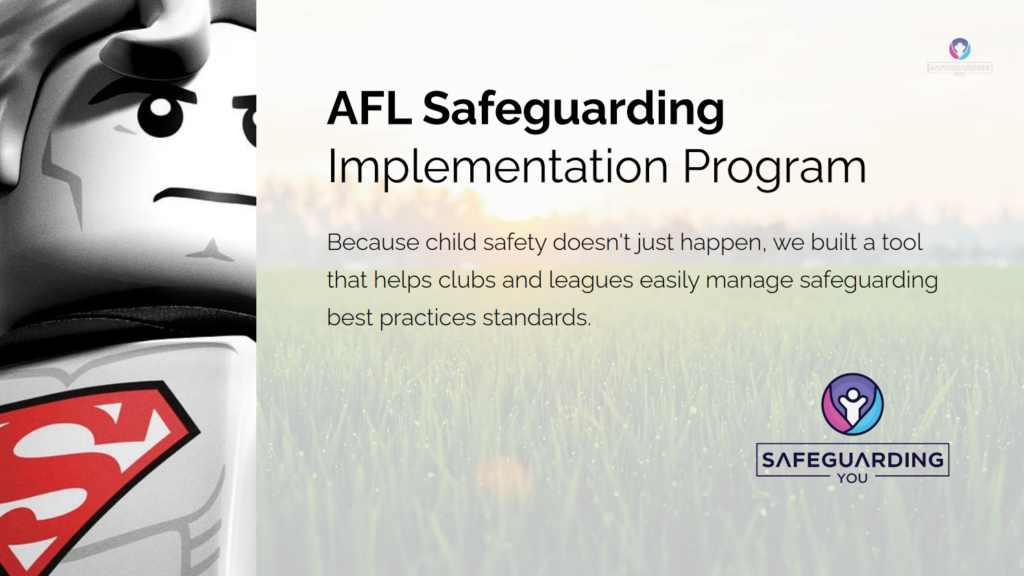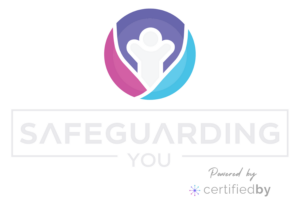Safeguarding AFL:
Protecting the Future of the Game
Because safeguarding kids doesn't just happen.
At Safeguarding You, we’re committed to making AFL a safe, inclusive, and empowering environment for every participant – on and off the field. From grassroots clubs to elite pathways, safeguarding isn’t just about compliance; it’s about creating a culture of care that ensures every player, coach, volunteer, and supporter thrives.
Our tailored programs for grassroots AFL leagues and clubs cover Child Safety and Concussion Management – all seamlessly integrated into one easy to use and affordable solution.
Changing the Game of Safeguarding
Complete
Safeguarding
Online programs in a central, easy-to-use platform for clubs to manage compliance, risks, and wellbeing.
Tailored for
AFL Clubs
Designed with the unique challenges of AFL in mind, our programs align with AFL standards and guidelines.
Empowering
Clubs to Thrive
More than just tools - we allow clubs to focus on what they do best... fostering a love of the game.
Online + Realtime Programs
Protecting Our Most Valuable Players.
AFL clubs are built on community and trust, yet child safety risks persist in many forms, from inappropriate conduct to inadequate safeguarding policies. Parents entrust their children to clubs with the expectation they will be protected and supported – but a lack of robust measures can erode trust and leave clubs vulnerable to serious consequences.
The damage caused by safeguarding failures is profound – children may face harm, families lose confidence, and clubs risk reputational and legal repercussions. Without the right policies and training, clubs may inadvertently create environments where risks are overlooked or mishandled, leaving children exposed.
Our child safety program equips AFL clubs with the tools, frameworks, and training needed to create safe environments for children. We help you implement AFL-endorsed child safeguarding policies, educate staff and volunteers, and provide streamlined incident management processes. By fostering a proactive approach to safeguarding, we help clubs and leagues build trust, meet compliance standards, and protect young players – the future of the game.
Prioritising Player Health
Concussion is one of the most significant risks in AFL, with incidents often underreported or poorly managed. Inadequate handling of concussion events not only jeopardizes players’ immediate safety but also risks long-term health issues, including chronic traumatic encephalopathy (CTE).
Failure to manage concussions properly can lead to severe consequences – prolonged recovery times, permanent brain injuries, and even legal claims against clubs. Clubs that lack clear protocols and training for coaches, trainers, and administrators may unknowingly endanger their players and their reputations.
Our concussion management program empowers AFL clubs and leagues to prevent, diagnose, and manage concussion incidents effectively. Aligned with AIS & AFL standards and best practices, our solution includes education for coaches and trainers, robust game-day protocols, and clear return-to-play guidelines. With Safeguarding You, your club can prioritise player health while ensuring compliance and reducing liability.
How It Works
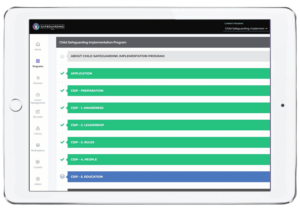
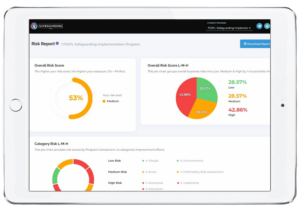
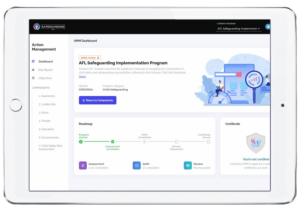
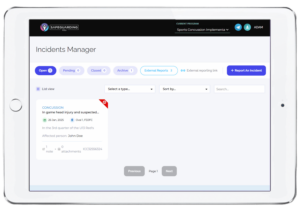
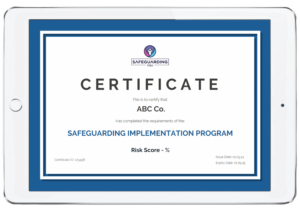
Programs Include
-
Smart Self Assessment
-
Risk Report: High-Med-Low
-
Action Management Module
-
Incident Management
-
Digital Library of Resources
-
24/7 Realtime Access
Program Modules
Child Safety
Awareness is crucial in managing safeguarding responsibilities, particularly for organisations working with minors. It involves understanding legal obligations, recognising potential abuse signs, and knowing the correct responses. Such awareness ensures proactive protection of vulnerable individuals, creating a vigilant and responsible culture that minimises harm and promotes a safe environment.
Leadership plays a pivotal role in safeguarding, setting the tone for an organisation’s commitment to protecting vulnerable individuals. Effective leaders model best practices, establish clear policies, and foster an environment where safety is prioritised. Their proactive approach and dedication to creating a secure environment are essential for embedding safeguarding into the organisation’s culture, ensuring that protection measures are not only implemented but also continuously improved.
Rules are the backbone of safeguarding within any organisation, providing a clear framework for behavior and procedures that protect vulnerable individuals. They establish concrete guidelines and boundaries, ensuring everyone knows their responsibilities and the actions required to maintain a safe environment. Implementing and adhering to these rules is crucial for a systematic approach to prevention and response, creating a structured and secure setting for all participants.
People are at the heart of safeguarding efforts, embodying the principles and actions that protect the vulnerable. Their awareness, vigilance, and commitment to following established rules and guidelines bring safeguarding policies to life. By actively participating in training, reporting concerns, and fostering a culture of safety, individuals within an organisation ensure a protective and supportive environment, demonstrating that safeguarding is not just a policy but a collective responsibility.
Education is a critical component of safeguarding, empowering individuals with the knowledge and skills to identify, prevent, and respond to potential risks. Through ongoing training and awareness programs, everyone within an organisation becomes equipped to recognise signs of abuse or neglect and understand their role in the safeguarding process. This continuous learning environment not only strengthens the protective measures in place but also fosters a culture of vigilance and proactive care, ensuring the safety and well-being of vulnerable individuals.
Environments play a key role in safeguarding, requiring careful design and management to ensure they are safe and nurturing for all. By prioritising security measures, accessibility, and a culture of respect and inclusivity, organisations can create spaces that inherently minimise risks of harm. Effective environmental safeguarding involves regular risk assessments, clear signage, and protocols that everyone understands and follows, ensuring that the physical and emotional well-being of vulnerable individuals is protected.
Concussion
Club governance frameworks ensure that you prioritise player safety by implementing and enforcing rigorous concussion management policies. This includes the appointment of a dedicated Concussion Officer, regular training for all stakeholders, and the maintenance of detailed records to track compliance and ensure best practices are followed consistently.
On the day of injury, appropriate protocols ensure immediate and effective management of suspected concussions. This involves removing the player from play, conducting an initial assessment using standardised tools, and providing a quiet, safe environment for further evaluation, ensuring no player returns to the game until medically cleared.
Return to play protocols are designed to prioritise the health and recovery of players. These protocols require a step-by-step, individualised approach, ensuring players are symptom-free and have received medical clearance before resuming full contact activities, thus preventing premature returns and minimising the risk of further injury.
For players experiencing prolonged symptoms or multiple concussions, a robust management system in essential. This includes comprehensive medical evaluations, tailored recovery plans, and ongoing monitoring by healthcare professionals to ensure safe and effective recovery before returning to play.
Reduce the risk of concussion and head impacts by emphasising proper training techniques, enforcing the use of protective equipment, and staying up-to-date with rule changes that promote safer play. A proactive approach aims to minimise the frequency and severity of head injuries in players.
Utilise comprehensive diagnosis techniques to accurately assess and manage concussions. This includes the use of tools like the SCAT6, regular medical evaluations, and incorporating input from parents and teachers to ensure a holistic understanding of the player’s condition.
Recognising the unique needs of children and adolescents includes age-appropriate concussion management strategies. Ensure that young athletes are fully recovered and have returned to normal school activities before resuming sports, with continuous monitoring and communication between parents, teachers, and healthcare professionals.
Clear roles and responsibilities are defined to ensure effective implementation. From the Concussion Officer to coaches, medical staff, parents, and players, everyone has a specific role in recognising, managing, and preventing concussions, fostering a collaborative and supportive environment for player safety.
Optional Extras... Review & Certify
This Means: Order a Program Review & Receive a Certificate of Assessment
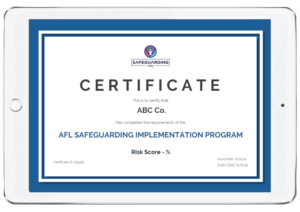
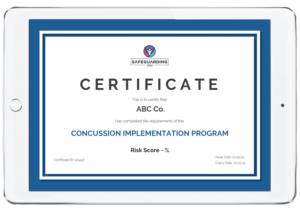
AFL Safeguarding Survival Guide
Tailored for club CSO’s, this guide cuts through the noise to deliver actionable strategies in Child Safeguarding.
More than just advice – it’s a blueprint for success. Avoid pitfalls, make smart decisions, and drive your organisation towards safer standards and sustainable growth. Don’t miss out on this opportunity to turn information into power.
The AFL Safeguarding Survival Guide
